Young Woman Gets Kicked Out Of Wedding For Bringing Her Service Dog
When a special event like a wedding arises, there's always a balancing act between accommodating individual needs and maintaining a festive atmosphere. A recent Reddit post posed an ethical question that has sparked considerable discussion: Who is in the wrong when a service dog causes controversy at a family wedding?
The main character in this true story is a 20-year-old woman with hypoglycemia unawareness. She has a trained Dobermann named Angel, who serves as her service animal to alert her of impending pancreatic attacks.
Angel enables OP to regulate her sugar levels by signaling when she needs to consume sugar, thus preventing her from passing out. The tension began when her health-conscious cousin Chloe, the bride-to-be, requested that OP leave Angel at home due to his imposing breed.
Chloe's concerns were primarily for her toddler, who has a fear of large dogs. Instead, Chloe assured OP that there would be enough sugar at the wedding to meet her needs.
However, when OP received the wedding menu, it was devoid of any form of sugar, carbohydrates, or sweets—posing a direct risk to her health. Left with no other options, OP decided to bring Angel along with some gummy candies to quickly regulate her sugar levels.
Though she sat discreetly in the back during the ceremony, Chloe discovered Angel at the reception venue. Despite the legal requirement for the venue to accommodate service animals, Chloe had an emotional meltdown, accusing OP of being selfish and demanding attention.
OP asks:

She is a 20-year-old woman with hypoglycemia unawareness. She has a trained Dobermann named Angel, who serves as her service animal to alert her of impending pancreatic attacks.
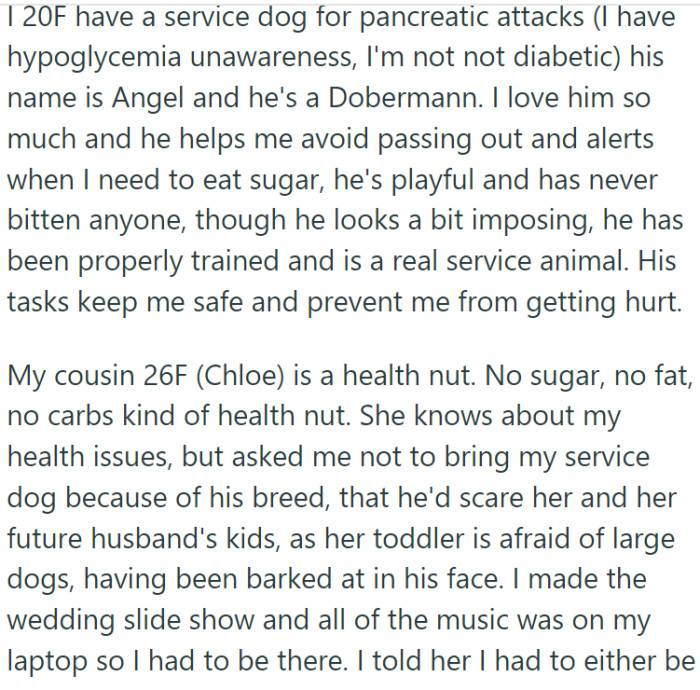
The tension began when her health-conscious cousin Chloe, the bride-to-be, requested that OP leave Angel at home due to his imposing breed.

The Role of Service Animals in Emotional Support
Bringing a service dog to an event like a wedding is not just a personal preference; it serves crucial psychological needs. Research shows that emotional support animals can significantly alleviate symptoms of anxiety and depression, providing comfort to their owners in high-stress situations.
Dr. Aubrey H. Fine, a noted expert in animal-assisted therapy, emphasizes that service animals can foster feelings of safety and emotional stability, making their presence in social settings particularly valuable.
Left with no other options, OP decided to bring Angel along with some gummy candies to quickly regulate her sugar levels.
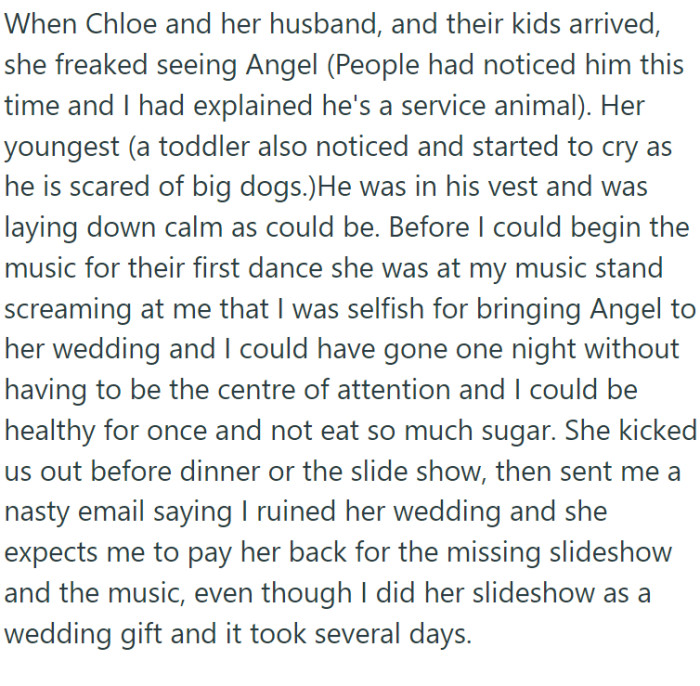
While OP regrets causing distress to Chloe's toddler, she argues that her medical condition and Angel's role as a service animal cannot be overlooked or dismissed.
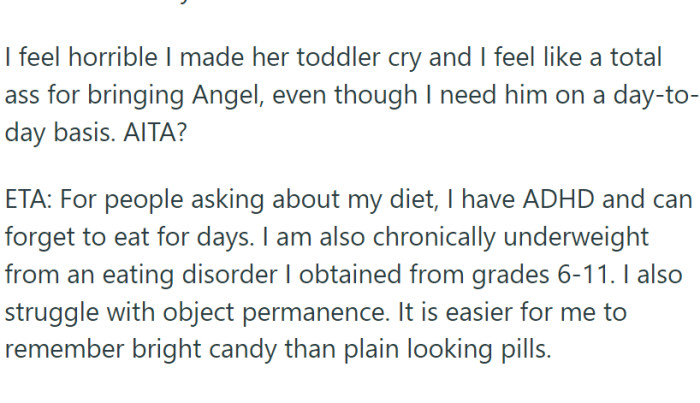
Depriving people of their service animals is deplorable.
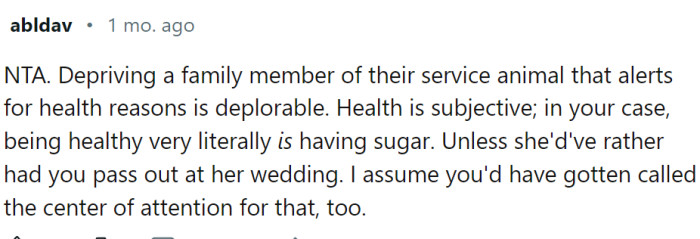
This situation also raises important questions about societal acceptance and understanding of service animals. According to the ADA (Americans with Disabilities Act), individuals have the right to bring service animals into public places; yet, misconceptions about what constitutes a service animal persist.
These misunderstandings can lead to discrimination and exclusion, as seen in this case, where the woman was asked to leave despite her dog's service status.
OP added some more about this family member, and it is not good:
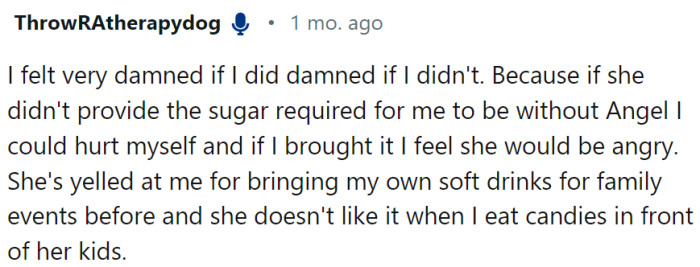
OP has a medical condition—she is not eating sugar because she likes it.
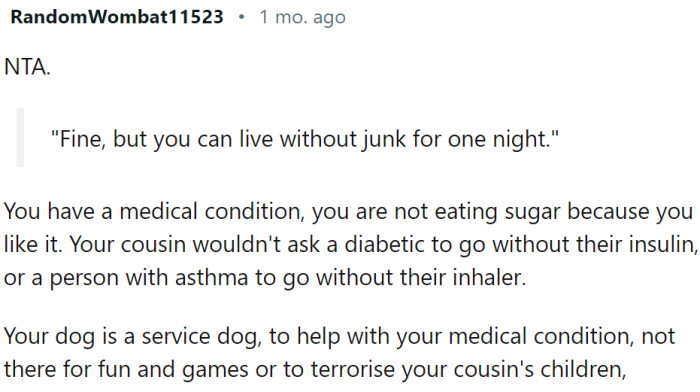
One Redditor asked:

Impacts of Social Dynamics on Service Animal Owners
Experiences like these can lead to significant psychological distress for individuals reliant on service animals. Studies indicate that facing discrimination can exacerbate feelings of anxiety and isolation, as noted in research by Dr. Barbara L. Fredrickson on the effects of social rejection.
Individuals may feel a heightened sense of vulnerability and may struggle to advocate for their rights in social situations.
OP responded:
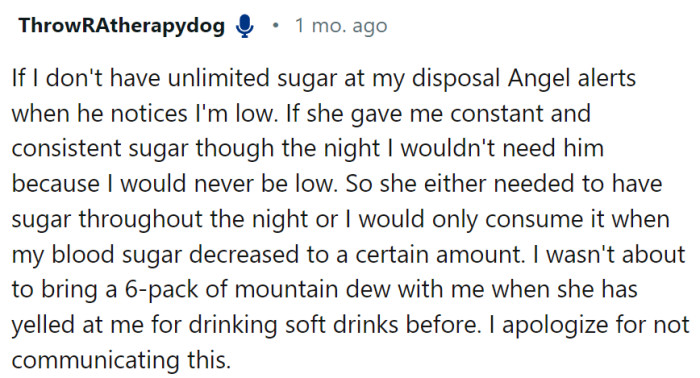
The cousin is clearly an ableist.
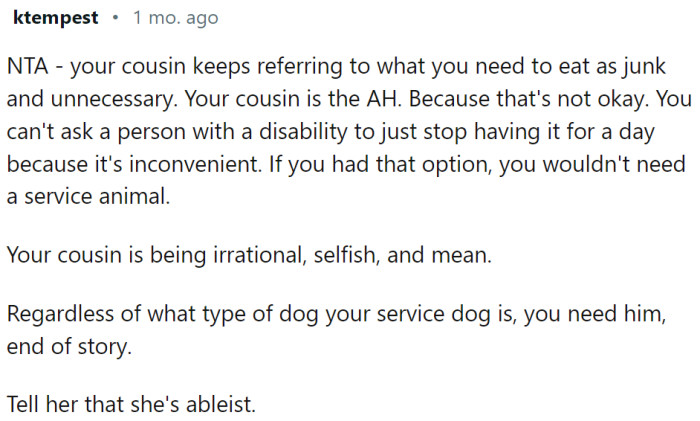
The bottom line is—there was no clear communication here.

To address these challenges, it's essential for individuals to educate themselves about their rights and the importance of their service animals. Engaging in assertive communication can also help in advocating for their needs.
Additionally, seeking support from advocacy groups can provide guidance and resources for navigating similar situations in the future.
Chloe's request for OP to leave her service dog at home could be seen as a form of ableism wrapped in the guise of a "health-conscious" lifestyle. It's evident that she doesn't fully understand OP's condition, instead chastising her for needing "junk food," a term that dismisses the very real medical need for quick sugar regulation.
Her assumptions prioritize her own vision of a 'perfect' wedding over the health and safety of a family member. While it's easy to paint Chloe as the villain in this situation, OP is not entirely without fault either.
One could argue that her decision to bring Angel might have been tinged with a bit of spite, knowing full well that it would disrupt Chloe's plans. However, it's important to consider that she was backed into a corner with very few options for managing her health.
Psychological Analysis
This incident underscores the ongoing challenges faced by service animal owners in public spaces. It's vital for society to recognize the essential role these animals play in supporting mental health and well-being.
Analysis generated by AI
Analysis & Alternative Approaches
In conclusion, navigating the complexities of service animal laws and societal attitudes can be challenging. Research highlights that increasing awareness about the roles of service dogs can promote acceptance and reduce stigma.
By fostering understanding and compassion, society can create more inclusive environments for all individuals.



